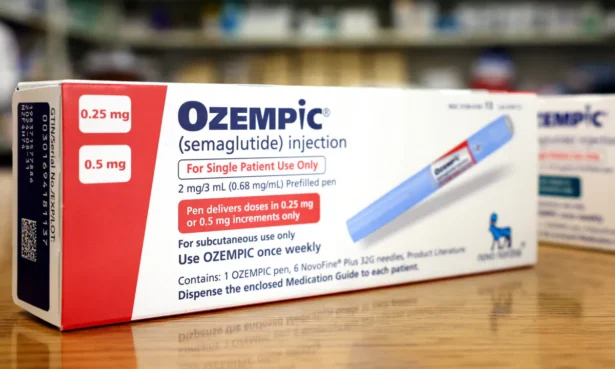Labels on the diabetes drug Ozempic have been updated to acknowledge reports of a condition that interrupts the normal function of the intestines in some individuals who have used the medication.
The U.S. Food and Drug Administration (FDA) made the label update for the drug on Sept. 22.
It now clearly states that a gastrointestinal disorder known as ileus is among some of the adverse reactions that have been reported during post-approval use of semaglutide, which is the generic name for Ozempic.
The newly-updated label now reads: “Because these reactions are reported voluntarily from a population of uncertain size, it is not always possible to reliably estimate their frequency or establish a causal relationship to drug exposure.”
Ileus is a temporary lack of the normal muscle contractions of the intestines which can lead to food not being passed properly or waste not being moved through the body as it typically would, according to the Mayo Clinic.
Individuals may be more prone to ileus if they have undergone abdominal or pelvic surgery, contracted an infection, or if they have certain muscle and nerve disorders, such as Parkinson’s disease, according to the Mayo Clinic.
Those who take certain medications that affect muscles and nerves, such as antidepressants and opioids, are also at increased risk of developing the digestive disorder.
Symptoms of ileus include abdominal cramps, loss of appetite, constipation, and vomiting along with an inability to pass bowel movements.

Ozempic Popularity Soars
The updated label comes as Ozempic—which is manufactured by Danish pharmaceutical company Novo Nordisk and is used to control blood sugar in adults with type 2 diabetes—has soared in popularity as an off-label weight loss aid in recent months, leading to widespread shortages.
The medication works by stimulating insulin production and reducing glucose production in the liver, helping to lower blood sugar levels.
A similar diabetes drug, Mounjaro, which is made by Indiana-based American pharmaceutical firm Eli Lilly, works by targeting the body’s receptors for the hormone GIP (glucose-dependent insulinotropic polypeptide) and a natural gut hormone called GLP-1 (glucagon-like peptide-1), thus suppressing appetite and reducing food intake.
Both Ozempic and Mounjaro were recently named in a lawsuit filed by a Louisiana woman who accused the diabetes drug manufacturers of failing to adequately warn users that the medications can cause severe gastrointestinal problems including gastroparesis, which is effectively a paralysis of the stomach, similar to ileus.
In her 26-page lawsuit, 44-year-old Jaclyn Bjorklund claimed she suffered severe injuries as a result of using the two injectable prescription medications including severe vomiting, stomach pain, gastrointestinal burning, and a loss of teeth.

Semaglutide Adverse Reactions
The lawsuit claimed that both Novo Nordisk and Eli Lilly “acknowledge that gastrointestinal events are well-known side effects of the GLP-1 class” but that they have “downplayed the severity of the gastrointestinal events caused by Ozempic and Mounjaro, never, for example, warning of the risk of gastroparesis (‘paralyzed stomach’) or gastroenteritis.”
Gastroparesis, for which there is currently no cure, is also caused by diabetes itself.
Additionally, the woman’s lawsuit states that neither manufacturer noted the risks of severe gastrointestinal events including gastroparesis and gastroenteritis when they announced they had received approval from the FDA.
Lawyers for the woman say hundreds of other users of the two drugs have complained of similar health issues and are weighing up suing the companies.
The FDA has received 87 reports of adverse reactions after use of semaglutide medications, including those from Ozempic, this year alone and more than 400 since 2018, according to data published by the regulator through June 30.
Approximately 250 of the overall adverse reactions are owing to gastrointestinal disorders, among them ileus, the data show.
“Although there is some overlap in the terms, ileus and gastroparesis, they are not synonymous,” FDA spokeswoman Chanapa Tantibanchachai said in a statement to CBS News.
The spokeswoman noted that labels for Ozempic and similar diabetes medications already state on their labels that the drugs may cause “delayed gastric emptying” but said the FDA is continuing to monitor “reports of gastroparesis and other related terms” in real-world use of the drug.
“If newly identified safety signals are identified, the FDA will determine what, if any, actions are appropriate after a thorough review of available data,” she said.
The Epoch Times has contacted the FDA for further comment.
From The Epoch Times


